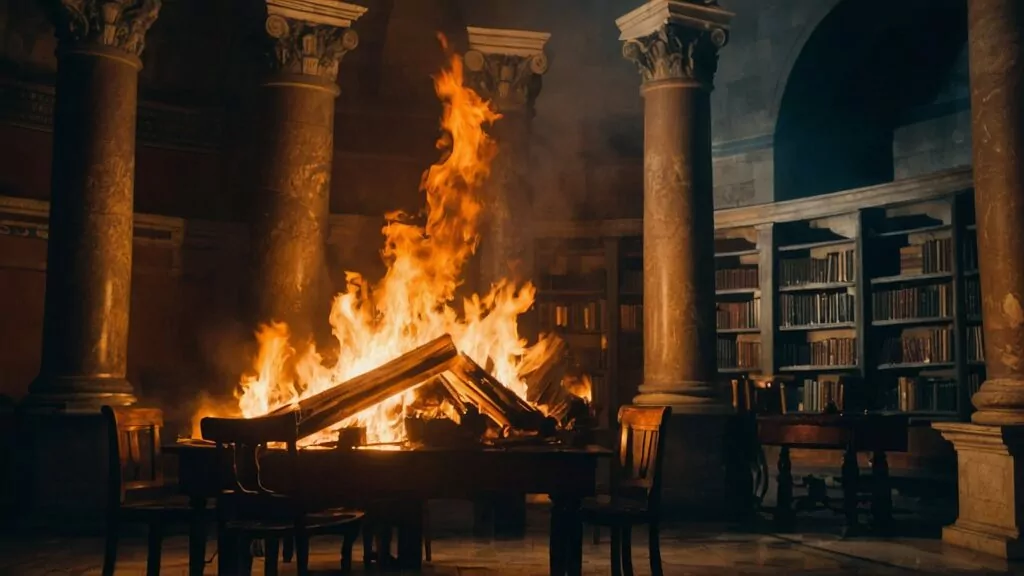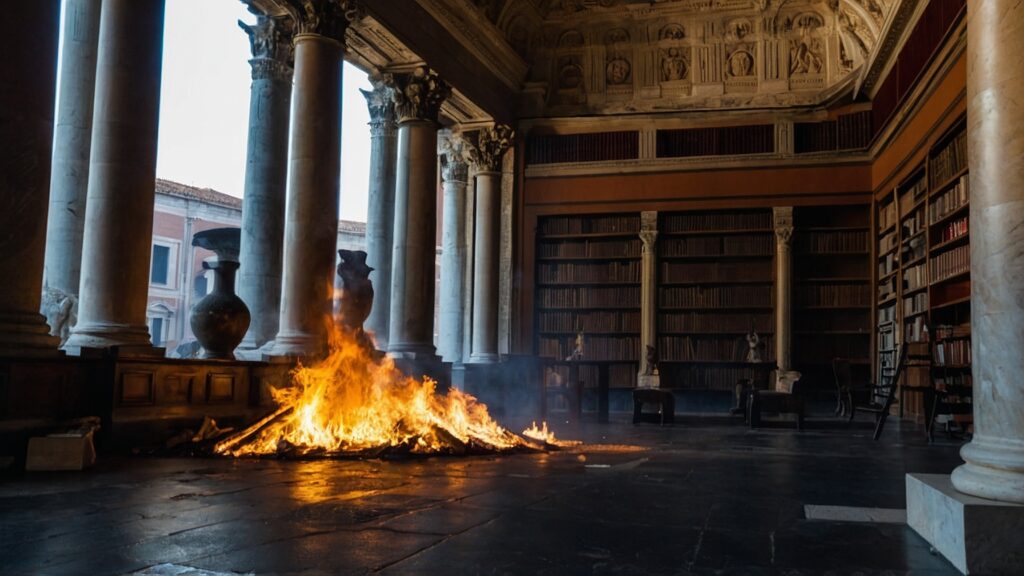Adverts
On a fateful night in human history, the Library of Rome, one of the largest and most precious collections of knowledge in the ancient world, was consumed by flames. This catastrophic event left indelible marks on history and culture, resulting in inestimable losses and altering the course of human knowledge.
Let us then explore the details of this tragic fire, its possible causes, its impact on humanity and the lessons we can extract from this remarkable episode.
Adverts
The Library of Rome: A Treasure of Antiquity

The Library of Rome, also known as the Library of Alexandria, was a center of learning and scholarship unparalleled in the ancient world. Founded in the 3rd century BC, it housed a vast collection of manuscripts, parchments and scrolls containing knowledge accumulated over centuries. Its rooms were frequented by scholars, philosophers and thinkers from all parts of the known world at the time.
Adverts
The Devastating Fire: A Night of Destruction and Loss
The fateful fire that consumed the Library of Rome occurred during the reign of Julius Caesar, in the year 48 BC. The exact circumstances that led to the fire are still a matter of debate among historians, but some theories suggest that the fire may have been the result of a act of war, sabotage or negligence.
Regardless of the cause, the flames quickly spread through the library's halls, consuming invaluable volumes of knowledge in a single night. Accounts of the tragedy describe the scene as an apocalyptic vision, with the heavens lit by fire as the wise men and scholars fought desperately to save what they could.
The Impact on Humanity: A Void in Collective Knowledge

The fire at the Library of Rome had a devastating impact on humanity, resulting in the irreparable loss of countless literary, scientific and philosophical masterpieces. The knowledge accumulated over centuries has disappeared into ashes, leaving a void at the heart of Western civilization.
Many of the lost works were unique and irreplaceable, representing discoveries and ideas that shaped the ancient world and laid the foundation for the future development of science, art, and philosophy. The loss of these priceless treasures left a scar on human consciousness, reminding us of the fragility of knowledge and the importance of its preservation.
The Paradigm Shift: Reconstruction and Renaissance of Knowledge
Despite the devastation caused by the fire in the Library of Rome, the history of humanity is marked by moments of rebirth and renewal. After the fire, significant efforts were made to reconstruct and reconstitute lost knowledge, culminating in the emergence of new academic institutions and libraries that preserved and expanded the legacy of antiquity.
Furthermore, the impact of the fire at the Library of Rome served as a painful reminder of the importance of preserving and protecting knowledge. This tragedy motivated later generations of scholars and librarians to adopt more rigorous measures to protect and disseminate knowledge, ensuring that the lessons of the past were not lost to oblivion.
Conclusion: Lessons Learned and Renewed Commitment
As we reflect on the tragic fire at the Library of Rome, we are reminded of the fragility of human knowledge and the importance of preserving it for future generations. This tragedy teaches us to value and protect our sources of wisdom and inspiration, and to recognize the transformative power of knowledge in the search for truth and understanding.
May we honor the memory of the Library of Rome by keeping its flame of learning and discovery alive. May we continue to preserve and share the knowledge accumulated over the centuries, inspiring present and future generations to reach new heights of intellectual and cultural achievement.




